Ask two former Creative Loafing music editors to wax nostalgic about the Charlotte music scene during their respective eras, and you're going to get an earful — after all, volubility about their musical loves and loathings helped land them the gig in the first place.
Over the course of Creative Loafing's three decades, we've followed everything from the rise of the American indie-rock scene that spawned Charlotte's Fetchin Bones alongside Georgia's R.E.M., to the alt-country and roots-rock tributaries that ushered in bands like Jolene and the Avett Brothers. We've documented the early-aughts explosion of Latin-alternative bands, the experimental avant-garde brewed up at Yauhaus, and the myriad of underground hip-hop and neosoul artists making homemade tracks today and releasing them digitally, including the Forever FC crew that gave rise to rapper Lute, who just last year signed on with J. Cole's Dreamville label.
We asked CL's first music editor, Fred Mills (1987-92), and one of his successors, John Schacht (2003-05), to discuss the city's music scene as it's evolved over the years. As they page through its 30-year back story, these windows in time tell us much about where we are today. Creative Loafing has been a trusted barometer, booster and occasional cattle prod over that time, chronicling the city's music scene from its humble and provincial roots to a diversity on par with any Southeastern metropolis. In later years, music editors Kandia Crazy Horse and Jeff Hahne kept news of Charlotte's evolving scene running through the later 2000s and 2010s.
After his stint at Creative Loafing, Mills went on to write for or edit numerous national publications including Option, Spin, Harp and Magnet. Schacht has written for Paste and Harp, and ran the regional music quarterly Shuffle from 2007 to 2011; he teaches courses at UNC Charlotte, including Popular Culture and the American Music Scene. Both Mills and Schacht still write about music — the latter writes for the former at Blurtonline.com, where Mills is editor in chief. — Editor
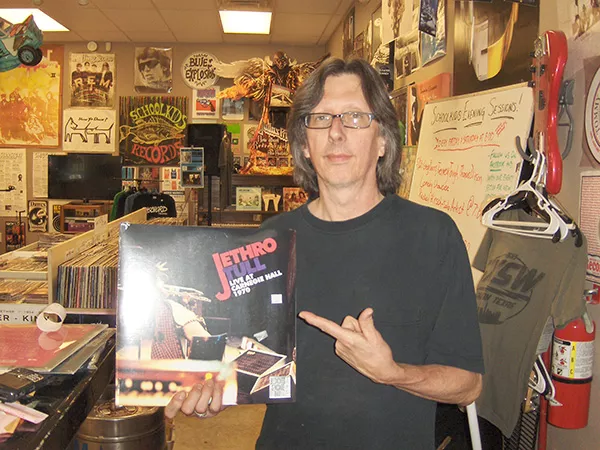
- Fred Mills in his element: a record store
John Schacht: It says something that every time Creative Loafing does an anniversary issue they come to you for your take, Fred -- you set the bar pretty high.
Fred Mills: I revisited that essay I did for the 10-year anniversary and reflected back on those five years, when my memories were still fresh. And just looking at my and John Grooms' attitude back then -- that summed it up quite well.
JS: Loafing had just expanded here from Atlanta when you started, right?
FM: Exactly. At the same time that Creative Loafing was moving into Charlotte there was another weekly that was setting up shop in Athens, Georgia as well. I got courted by both, but I knew (Editor emeritus) John Grooms really well, whereas these other people were from out of town. And then of course around that same time when the Observer got wind of Loafing they started up BREAK to compete for advertising.

- John Schacht
JS: I love that story you told about Break courting you -- "As the editrix schmoozed me over instant coffee and stale donuts, I inquired as to the level of music coverage BREAK had in mind. 'There's a Billy Joel show coming next month to the Coliseum. I think our readers would enjoy a 750 word profile on the man.' I'm surprised that you didn't take the "Piano Man" bait...
FM: (Laughs) I can state for the record my loyalties will always be with ANTiSEEN, my friend.
JS: It's hard to get across to people under a certain age how essential alt-weeklies were in fostering the parts of the nation's underground music scene. Since you were there at the very beginning of Loafing Charlotte, tell us about what it was like back then.
FM: Radio in Charlotte at the time was the pits. Concurrent with that era, a lot of bands were coming out of the woodwork -- it was definitely some real good synchronicity and some mutual respect because here was Loafing taking bands like ANTiSEEN and Fetchin Bones seriously. And that in turn gave all these other little garage and bedroom musicians the idea that maybe they could do something because people were paying attention to them. I won't say Loafing should take all the credit for jumpstarting the scene, but I know we were definitely there cheering it on and doing anything we could to support it.
JS: I always saw that as the gig -- being an advocate for the underrepresented, and also doing zeitgeist stuff in a more thoughtful and provocative way. The Avetts were just kicking into that extra-regional gear when I started in 2003, it was clear they were going to be just fine without us so I just felt our limited space would be better spent highlighting lesser-known bands or touring acts that weren't featured in the Observer. Of course, I caught some shit from people who said we weren't following The Avetts enough. Yet I also remember an email I got from a local dance club promoter bitching about something we wrote about them and even asking me -- I shit you not -- "who the fuck are the Avett Brothers, anyway?" That just told me we were on the right path. Was that kind of your mindset?
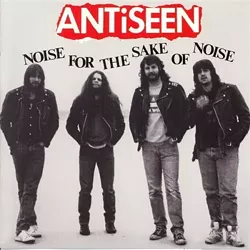
- 1989 ANTiSEEN album
FM: I totally get that. One interesting facet of the Charlotte scene in the late 80s and into the early 90s was that it was perpetually operating under the shadow of the Triangle. A lot of those bands were getting known nationally, but initially, at least, the only bands that were getting much ink outside Charlotte would be Fetchin' Bones. At one point Fetchin Bones was the band everybody thought was poised to break through on like an R.E.M. level, and then in a more, pardon the pun, anti-scene manner, ANTiSEEN, who were really underground but were moving beyond the hardcore crowd they initially appealed to. And, soon enough, you found old school punks really embracing ANTiSEEN. I can't say that ANTiSEEN was going to get covered by Rolling Stone any time soon, whereas Fetchin' Bones did get reviewed by Rolling Stone, but it was there. And you had like a real mainstream, hard rock metal band in Sugarcreek, later The Creek, and the perennial Spongetones that everybody loved and respected.
As we got to the late 80s and into 1990, say, you suddenly had this groundswell of scenes within the larger scenes. For example, there was definitely the neo-psychedelic scene spearheaded by Mitch Cooper and The Inn. They had these Psychedelic Sundays that they put on at clubs. It'd be The Inn and Sloppy Joe and the Rhythm Section, Trees, the Ravelers, Other People -- so there was that scene. And there was a very, very strong heavy metal scene, too, epitomized by Firehouse, who during that period probably went farther nationally than any band in town. There were other bands like the glam-metal Lickety Split, the more punk metal of Seducer. There was a Goth scene and the stirrings of a roots rock scene, such as the Belmont Playboys and David Childers.

- The Milestone on Tuckaseegee helped lay the foundation for the local music scene CL would follow in the late '80s through the '90s, bringing in bands like R.E.M. and Husker Du.
Once a few bands started pulling in crowds and graduating from, say, the Milestone Club to the Pterodactyl Club, it inspired a lot of other bands to come out of the woodwork and give it their shot, too. Coincidentally or not, Loafing's arrival roughly coincided with the rise of the Amerindie Underground that R.E.M., Husker Du, etc., had pioneered. This meant that by 1987-89, there was a genuine network of clubs around the country, which in turn meant there were more people such as club bookers able to operate professionally, which in turn helped Charlotte get on the radar of national bookers and managers. Pretty soon, you had a situation where bands would play Chapel Hill and then Charlotte en route to Atlanta and Athens, instead of skipping Charlotte altogether. This opened up additional possibilities for local groups to open for name and signed acts and be seen by a wider audience. I forget who opened for the Replacements at the Milestone, but you can bet that was something they could put on their resume.
JS: Was there a concurrent growth in venues, too, back then? There's an obvious contraction now -- it hardly seems real but the Double Door Inn recently shut its doors, and the Milestone seems to be hanging on by a thread. That big room destination that was considered part of the natural progression back then just doesn't seem to be as important. That contraction could've started when I was at Loafing, as it was pretty obvious the market had more mid-size rooms -- Tremont, Neighborhood Theatre, Visulite, Amos' -- than was needed considering the fickleness of Charlotte music fans and the conservatism of so many bookers; too many dark nights and tribute bands to sustain all those rooms. But one of the first stories I did was profile the new Milestone owners, who launched themselves into reviving that venue with a kind of harrowingly manic dedication -- they wound up living there, basically, fending off crack addicts and shooting rats in the early days of the club's comeback. And they also gifted us, literally, Andy the Doorbum, one of those eclectic voices so key to a healthy music scene.
FM: Concurrent with the rise of all those bands I mentioned, you originally had, say, Viceroy Park, Milestone Club, Double Door Inn, the Cellar...and maybe Kidnappers, too. But pretty soon Jeff Lowery and Tim Blong got the Pterodactyl off the ground and at one point they owned both that and the Milestone. Bob Okamoto started the Park Elevator over on South Boulevard, and that gradually morphed into the 13-13 Club also run by Jeff and Tim. You had the Yellow Rose, they booked a lot of punk and hard-core, that was the first place I ever saw ANTiSEEN and bands like Social Savagery. And then you had clubs aimed more at the metal crowd, like Jeremiahs on Independence Boulevard and later Rocky's. So it was expanding, not contracting, during that same period.
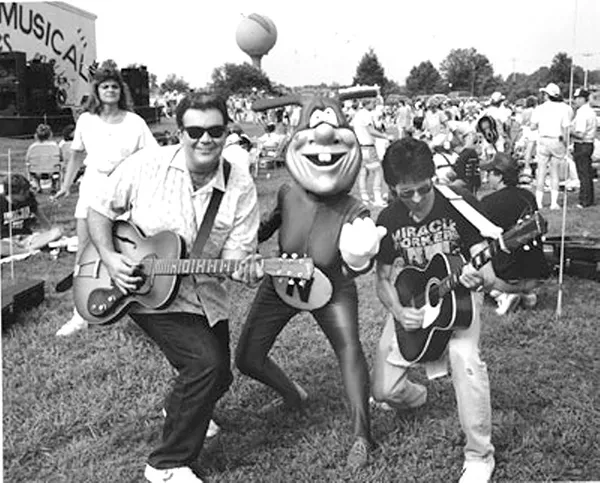
- Fred Mills (right) and editor John Grooms rock out at a CL function back in the day
The excitement was very real -- part of it was, in line with what I said about the Triangle getting all the ink, there was a hunger among Charlotte-area bands to prove themselves that they were every bit as good and had as much potential as Triangle bands like the dBs and Let's Active. They also seemed to really be bonding together just for the sheer joy of community. The perfect example of that would be The Inn and the Psychedelic Scene, and the psych- and proto-jamband scene that they spearheaded. Everybody was helping each other out and sharing touring tips and sharing gig tips. Then there was the occasional band getting written up in a fanzine or maybe the stray mention in the Village Voice or Spin, and rather than people feeling overly competitive -- and now I may be candy coating it a bit -- it did seem like people celebrated little successes like that. And they continued to make inroads pretty soon, a lot of these bands were beginning to get gigs in the Triangle and there was good cross-pollination between the Athens, Georgia scene and the Triangle scene, and a lot of those bands would come up and play and then let those Charlotte bands go down there and open for them. So in one sense it was a golden era -- although it's probably also nostalgic candy coating, depending on your outlook -- there were probably a lot of bands that went nowhere and considered it a dead time for them.
JS: That Triangle inferiority complex was less evident after the 90s. The biggest kvetch you tended to hear from music fans was about having to drive up there (or Asheville) to see bands that might never come to Charlotte. But by the 2000s, many of those bands you'd driven to see at Cat's Cradle or Local 506 began playing Charlotte. Credit to the Yauhaus gang and Brian McKinney for booking bands like Phosphorescent, Magnolia Electric Co., Little Brother, Xiu Xiu, SMOG, Do Make Say Think -- not your standard fare. Still, you didn't have that captive student audience that you have in Chapel Hill so the attendance numbers could really vary. I remember one show McKinney booked at Amos', featuring Dead Science, Court & Spark (now Hiss Golden Messenger), Shearwater and Carla Bozulich; there were maybe 10 people in that cavernous room, even after we previewed it in Loafing. It was amazing, and totally depressing at the same time. But the local scene itself was by any other measure healthy. How was the label scene in Charlotte back in your day? By the early 2000s, Ramseur had planted their flag, MoRisen was making some waves with The Talk and Elevator Action, and there were the usual boutique, vanity or one-and-done efforts. But that groundwork was laid during your era, no?
FM: Early on you did have ANTiSEEN putting out their own records, and I think that was the model for a long time -- bands just creating their own little one-off labels to release their stuff. But eventually you had label rosters. I know that The Inn in particular, they had a label that they put out records by other bands of a kindred spirit. And it was a pretty big deal when Chris Peigler's band, Intensive Care, put out an album, because they put a lot of money into it, and it was the kind of thing that a lot of bands paid attention to -- 'hey, we can do this, too.' And you would have a lot of self-released cassettes, of course, and some singles. When Creative Loafing started putting on Night Fest —which was the answer to Spring Fest, which we thought was pretty vanilla — I'll never forget having to go through probably over a hundred cassettes that people had sent in to try and get to play Night Fest. It was just nuts, but it showed you how many people were out there making music.
JS: Your experience with Spring Fest mirrored ours with City Fest 15-20 years later. I forgot what year it was, 2003, I think, but Hootie and the Blowfish were the headliner, along with a litany of other past-their-prime acts, and I think there might've been one local act on the bill. We had some preliminary talks with some promoters around town to come up with a counterpart, but nothing came of it -- eventually, Zach Reader and Casey Malone came up with Recess Fest, and Self Aware Records' Treasure Fest ran concurrently for a while, and now Reverb Fest has kind of stepped into that same space. (Creative Loafing also hosts the Moo & Brew Festival, in its second year.) And now we don't even have a Spring Fest or a City Fest. Do you think shrinking music audiences are due to streaming services, YouTube, Bandcamp and Soundcloud? Don't get me wrong, it's great from a music fan standpoint. But the ubiquity of music now seems to have made concerts much less of a big deal than they used be -- and you mentioned that a lot of bands from your era aren't even represented on these sites.
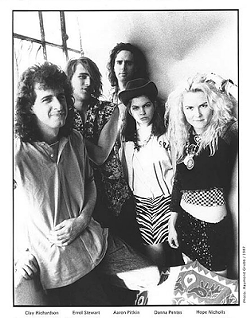
- Late-'80s Capitol Records promo shot of Fetchin Bones
FM: In preparing for this I went on Spotify to see what bands from that era had gotten their stuff belatedly up on a streaming service, and honestly ANTiSEEN and Fetchin Bones and Spongetones were the only ones I could find. I didn't have time to check for everybody, but there's so many bands from the Charlotte area and region, from that time period, whose stuff is basically kind of lost to time. But it constitutes an unwritten history of the town and the era.
For the time being, YouTube is kind of the go-to venue for hearing some of these bands because you'll have an old band member or fan transfer an LP or a couple 45s to digital and put it up on YouTube. So to me the logical next move would be for some of these folks to figure out how to get onto streaming services -- I mean, let's face it, you're not going to make a bunch of money via music streaming services. But it's better than not having it up there at all -- taking a stand to have it be compensated is absolutely needed. Think about all these bands like Misguided Youth and Van Gogh's Ear or Adam Shame and the Blind Dates, Second Skin, or Hard Soul Poets, Phantom Tennants, God's Water --Discord, man what a great band. Helpless Dancer, the Dalai Llama, which featured a young Tara Bush in there. All these bands, they deserve to be heard. Who knows if anyone would actually buy a record, at this stage it would probably be just friends and family and fans who remember them fondly. There should be some kind of permanent record on them somewhere out there.
JS: We're part of that permanent record, wouldn't you say? And we build on the work of those who dug around in the non-obvious places for new music before us. I had invaluable help from Timothy C. Davis, who'd been at Loafing several years by the time I got there, and some freelancers I could plug in where needed. But the news holes were a lot bigger in those days than they are now.
FM: In all honesty, I was the music division of Creative Loafing. I was the default person, and John Grooms would write about stuff he really felt strongly about, and that was pretty much it, other than the occasional person weighing in. And that typically would be these group things -- oh, like The 100 Greatest Rock 'n' Roll Films, and a great one that John and I came up with called The 100 Greatest Intro Riffs to Rock Songs.
JS: That was a big part of the joys of alt-weeklies, was getting to do stuff like that that you'd never see in the local newspaper. We did a weird round-table review of the Metallica documentary, Some Kind of Monster, a list of lesser-known records we thought would survive the test of time, and a Super Bowl Half-time Acts We'd Like to See piece that we pulled out of our ass at the last minute. One of our bigger hate-mail generators was a Pro/Con piece Tim and I did on Ryan Adams—apparently, a lot of people who love Ryan Adams also enjoy writing scalding letters to editor. But then I thought it was kind of important to have detractors -- a music scene is healthier when it can withstand people criticizing it.
FM: I totally agree, and that was definitely a high-wire act that John and I performed. We had many discussions about it because, on the one hand, we did feel like it was our mission to help make the scene stronger, and as I said earlier, give credit where credit is due and give some of these bands exposure. But on the other hand, we were a little sensitive to when people would say -- and I'll continually use ANTiSEEN and Fetchin' Bones as examples -- 'oh, you never had a bad word to say about them.' I was aware that there was a certain degree of boosterism, and as I went along and became a little bit more confident in my writing and feeling like, 'hey, we are doing real journalism here,' I became a little bit more critical during the five years I was there. I do remember kind of raising the ire of Jeff Lowery of the Pterodactyl and Milestone clubs because I got a little bit more critical in the music menu of the shows coming to town. I characterized what I'm sure was a proto-jam band coming to town as "lame, white boy reggae," it was kind of disdainful, and Jeff was not happy at all. He even said something to an ad rep that handled his account. It did go with the territory, there were times when I felt like, 'damn, I wish I could just go out and hang out at the back of the club without somebody coming up to me and either giving me grief about something I wrote about or hand me a tape of their new band. There was a certain notoriety that went with the gig that was sort of a love/hate relationship.
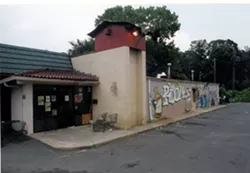
- The late Jeff Lowery has several influential music clubs in CL's years including the Pterodactyl and later, the Room (pictured).
JS: Sweet, sweet anonymity! Yes, I remember it well. Is there any genre of music, looking back, that you would cover differently? I did a long story on the EDM scene, which I knew precious little about at the time, but thanks to a receptionist on staff I got hooked up with the right people and the right DJs, the folks who were really artistically committed beyond the basic 'let's drop some Molly this weekend and rave' culture. Most of them were centered around the club, Tonic. I probably could've done more to highlight local hip-hop artists, since they had started to cross over with gigs at The Room, the ill-fated venue on Montford, right when Loafing and I parted ways.
FM: Hip-hop came to the Charlotte area very belatedly, and I'm going to qualify that by saying I was not a habitué of the African-American clubs in town, although my impression is that at the time those were primarily DJ-related. But I do remember, in the wake of the 2 Live Crew controversy, Schoolly D had been booked to play in Charlotte, possibly the 4808 Club, and they cancelled that out of fear that you would have a repeat of the 2 Live Crew obscenity blow-up -- of course not long after that we had the GWAR incident (Editor's Note: recounted in Mills' review of 4808 club owner Michael Plumides' book, Kill the Music, in Blurt), so so much for steering clear of the Moral Majority.
I was a stringer for Billboard magazine at this time, too, and I remember going to a show at the Coliseum, it was MC Hammer, Kid 'n' Play and Digital Underground. And that could've easily been a watershed moment. Hip-hop and Charlotte was still primarily restricted to the Coliseum -- you had Run DMC and the Beastie Boys come, I was at that, that was good. So I certainly was getting an appreciation for it, but I just wasn't exposed that much. In '89, George Clinton and the P-Funk All-Stars came to the 13-13 Club, that was a rainbow audience and it was an amazing show, like two-and-a-half-hours of jamming. And I remember thinking to myself, 'wow, this could be the start of something really significant if a lot of local bands are inspired by this.' But of course, in America at that time, hip-hop was taking off and bands inspired by Clinton were headed towards rap careers, and not just straight funk.
JS: One of my agendas was getting more experimental music into the pages. We had a couple of local outfits at the time, Pyramid and Calabi Yau, that were really pushing at the boundaries of rock music in their own different ways. Both of them—and especially Pyramid, which had eight or nine members at various times—were really intent on crosspollination, too. (You can still find folks from those bands scattered throughout local bands today, by the way). So you'd have these experimental inclinations cross over into other more traditional bands or arts events, like a week of live-scoring silent films or a trio of bands performing each other's songs in one enormous super-band. We also bought in immediately to the early Fool's Brigade benefits, which brought together local bands of all stripes in tribute to CBGB, David Bowie, the Kinks -- it was one of those super-fun community building events you don't appreciate fully until it's not there anymore.
FM: One genre I wish I had covered more even though I did quite a bit, was the roots rock scene in the area there. We always covered the Belmont Playboys, but they were almost our representative roots rock band, and then there were just a few others that we covered. That's partly because Whiskeytown had not happened yet; after Whiskeytown happened, it showed a lot of bands that they could do that, too. It always goes back to musicians being shown, 'hey, we can do this too if they're doing it.' And that's what would've helped get that scene off the ground in Charlotte -- I mean, you had the Hard Soul Poets to a certain extent, you had Gary White of the Yokies and Skeeters -- they had kind of a hippie roots rock style. But there was just not a whole lot going on during the time I was there, though I know it began taking off in North Carolina in the early 90s, and that was when I moved to Tucson.
JS: Yes, well, thanks for leaving that for us....
FM: Yeah, everything that happened after '92, you guys can thank me for. But seriously, Creative Loafing has a legacy of having very good, attentive music writers that understand that not only is it their job to cover the local scene, it's to do it with a little bit of intelligence.
Conversation compiled and hacked to pieces by John Schacht; for a longer version, visit our website @clclt.com.
C